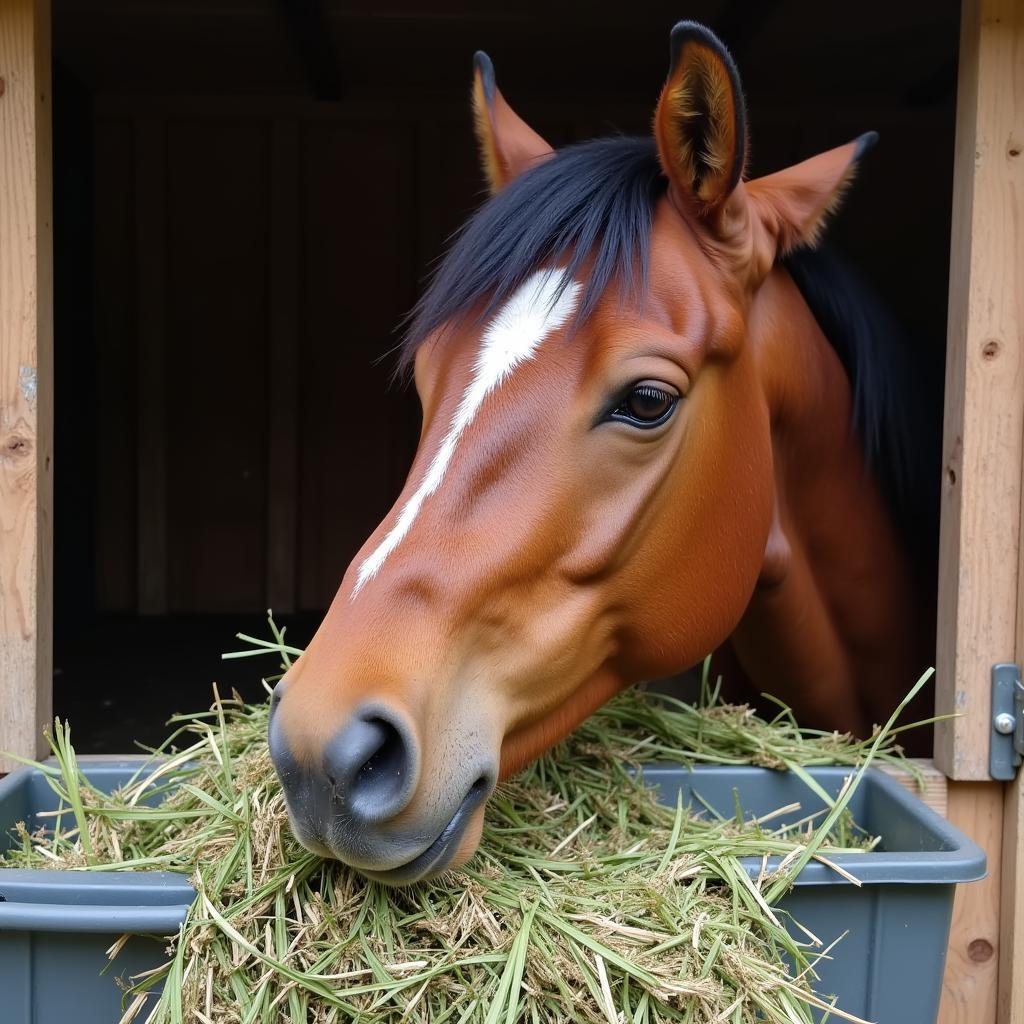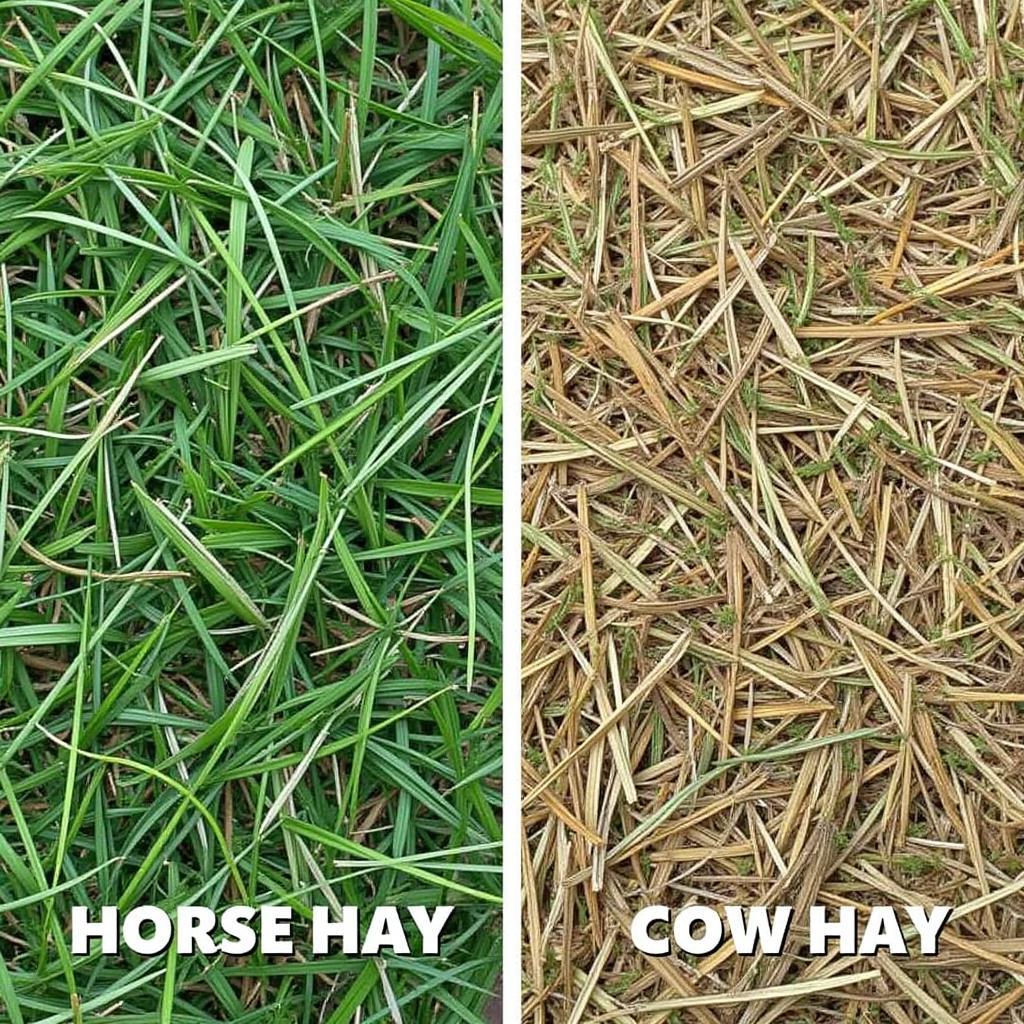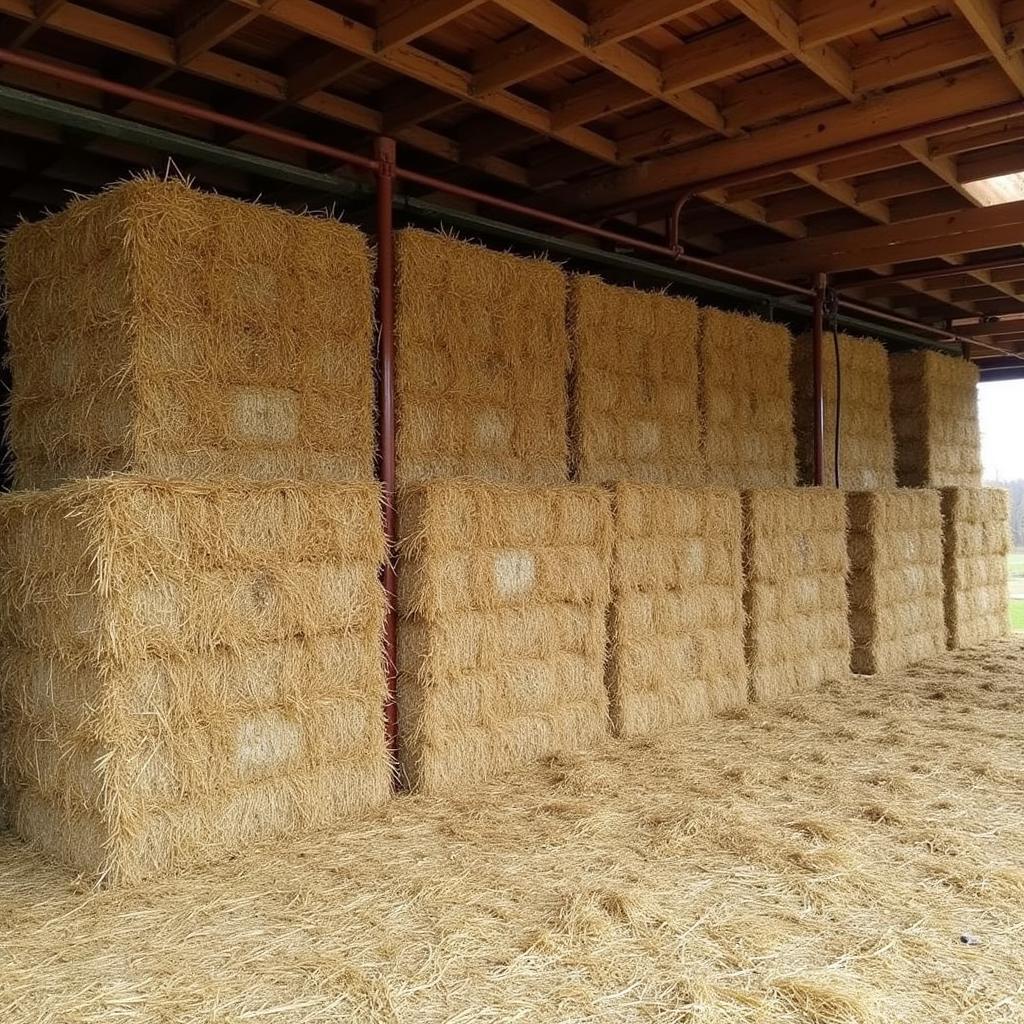Hay is a crucial part of many herbivores’ diets, but is it equally beneficial for horses and cows? While both species enjoy and can digest hay, their digestive systems and nutritional needs differ significantly, leading to variations in how hay impacts their health and well-being. Understanding these differences is key to providing optimal nutrition for both horses and cows. Let’s delve into the specifics of hay for horses versus cows.
Digestive Differences: Horses vs. Cows
Horses and cows have evolved distinct digestive systems. Cows are ruminants, possessing a four-compartment stomach designed to break down tough plant fibers like those found in hay. This complex system, involving fermentation and regurgitation (cud chewing), allows cows to extract maximum nutrients from lower-quality hay. do horses chew their cud Horses, on the other hand, are non-ruminant herbivores with a single-stomach system and a large cecum (part of the large intestine). While they can still digest fiber, their system is less efficient than a cow’s, requiring higher-quality hay for optimal nutrition.
Why Hay Quality Matters More for Horses
Since horses lack a rumen, they rely more heavily on the small intestine for nutrient absorption. This means the hay they consume must be easily digestible. Low-quality hay, often high in lignin (a tough, indigestible fiber), can lead to impaction colic and other digestive problems in horses. Therefore, horses thrive on hay that is softer, leafier, and less mature than what is typically fed to cows.
 Horse Eating High-Quality Hay
Horse Eating High-Quality Hay
Nutritional Needs: What Each Species Requires from Hay
Both horses and cows require essential nutrients from hay, including fiber, protein, vitamins, and minerals. However, their specific requirements vary based on their size, age, activity level, and physiological state (e.g., pregnancy, lactation). For example, growing horses and lactating mares require higher protein and energy levels than mature, idle horses. Similarly, dairy cows have significantly higher energy and protein requirements compared to beef cattle. horse cow These nuances highlight the importance of selecting appropriate hay types and balancing rations to meet the specific needs of each animal.
Choosing the Right Hay: A Species-Specific Approach
For horses, selecting hay involves considering factors like maturity, leafiness, and nutrient content. Common hay types for horses include Timothy, Orchardgrass, and Alfalfa, each offering different nutritional profiles. Cow hay, on the other hand, can include a wider range of grasses and legumes, and the quality requirements are generally less stringent. “Choosing the right hay is crucial for maintaining optimal health and preventing digestive issues,” explains Dr. Emily Carter, Equine Nutritionist at Justus Horses USA. “For horses, this often means prioritizing quality over quantity.”
 Comparing Horse and Cow Hay
Comparing Horse and Cow Hay
Hay Storage and Feeding Practices
Proper hay storage and feeding practices are essential for maintaining hay quality and preventing health problems in both horses and cows. Hay should be stored in a dry, well-ventilated area, protected from moisture and pests. Feeding hay in a clean, accessible manner can also help minimize waste and reduce the risk of contamination.
Avoiding Respiratory Issues in Horses
Dusty or moldy hay can cause respiratory problems in horses, particularly those prone to allergies or heaves. Soaking or steaming hay can help reduce dust and improve its palatability. Dr. James Miller, Large Animal Veterinarian, adds, “Proper hay storage and handling is paramount in safeguarding the respiratory health of your horse. Investing in quality hay and suitable storage solutions is a worthwhile investment in your animal’s well-being.”
 Hay Storage Best Practices
Hay Storage Best Practices
Conclusion
While hay is a staple in the diet of both horses and cows, their different digestive systems and nutritional requirements necessitate distinct approaches to hay selection and management. Understanding these differences is paramount for ensuring the health and well-being of these animals. By prioritizing quality hay and implementing proper feeding practices, owners can contribute to the overall health and longevity of their horses and cows. Remember, what might be acceptable hay for cows might not be suitable for horses.
FAQ
- Can horses eat cow hay? While horses can eat cow hay, it is not ideal due to potential differences in quality and nutrient content.
- What type of hay is best for horses? Several hay types are suitable for horses, including Timothy, Orchardgrass, and Alfalfa. The best choice depends on the individual horse’s needs.
- Why is dusty hay bad for horses? Dusty hay can irritate the respiratory system of horses, potentially leading to breathing problems.
- How should hay be stored? Hay should be stored in a dry, well-ventilated area, protected from moisture and pests.
- How much hay should a horse eat per day? The amount of hay a horse should eat depends on its size, activity level, and other factors. Consult with an equine nutritionist or veterinarian for personalized guidance.
- Can cows eat any type of hay? Cows can eat a wider variety of hays than horses, but the quality and nutrient content still impact their health and productivity.
- What are the signs of poor quality hay? Signs of poor quality hay include excessive dust, mold, discoloration, and coarse stems.
For further information, you might find our articles on do horses chew their cud and horse cow helpful. We also encourage you to explore other resources on our website for more in-depth information on equine and bovine care.
Need help with your horse or pet? Contact us at Phone Number: 0772127271, Email: [email protected] or visit our address: QGM2+WX2, Vị Trung, Vị Thuỷ, Hậu Giang, Việt Nam. We have a 24/7 customer service team ready to assist you.